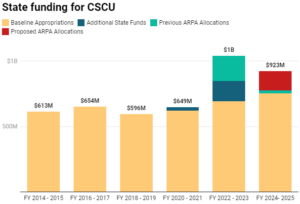Dozens of state leaders representing Connecticut State Colleges and Universities (CSCU) packed the Legislative Office Building on Monday to air their dissent of an approved budget that would lead to more than 650 full-time faculty and staff layoffs, axe 3,000 part-time positions and raise the possibility of potential college closures.
The budget cuts would be “devastating,” according to CSCU President Terrence Cheng. One university professor even remarked that Gov. Ned Lamont could be remembered as the “education destroyer” for this move.
The overall state budget for the state’s higher ed system is dropping by $117 million, but a significant reason for that is due to the last budget’s sizable allocation of emergency federal aid post-COVID. Specifically, the American Rescue Plan topped Connecticut off in fiscal year 2022-23 with another $195 million. Now, as HEERF III spending sets to expire at the end of June, long-term programs and initiatives partly funded by temporary aid are under threat.
“We’re about to fall off that cliff,” said Higher Education Co-Chairman Gregg Haddad to CT Insider referring to the reliance the state system placed on those one-time federal aid investments.

More from UB: Cash is king for this university’s new student success strategy
Programs in trouble
Student support services such as mental health support and academic advising will be severely impacted by the cuts, according to Chen. Academic programs in manufacturing and healthcare can be taking a hit, too, which he wages will directly impact the state’s economy.
His proposed plan to make all community college tuition-free to all students may also be in trouble, considering it called for a $54 million budget increase from 2023, and another $127 million more the following year. Chen believes the Pledge to Advance Connecticut program can expand higher education opportunities to lower-income and first-generation students and help fill workforce shortages in nursing, teaching and mental health counseling.
State pushback
Despite the challenges Connecticut’s budget has placed on the state’s college system, some legislators believe it’s up to the school leaders to figure out how to operate without a ballooned budget, considering Connecticut’s enrollment has steadily declined.
“CSCU’s request for additional funding appears to be based on a belief that one-time federal funding to compensate for COVID-related costs should continue in perpetuity,” said Secretary of the Office of Policy and Management Jeffrey Beckham, according to CT Insider. “Simply asking for ever-increasing operating subsidies is not sustainable. Before looking to the taxpayers and students for additional funding, they must get their costs under control and in line with the current and expected future demand for students, which has decreased by 36 percent in the community colleges and 21 percent at the regional state universities.”
The state has steadily increased baseline appropriations for CSCU by $159 million since 2018. Since taking office, Lamont will have been responsible for raising total state funding by 55% or $334 million, according to Beckham.



